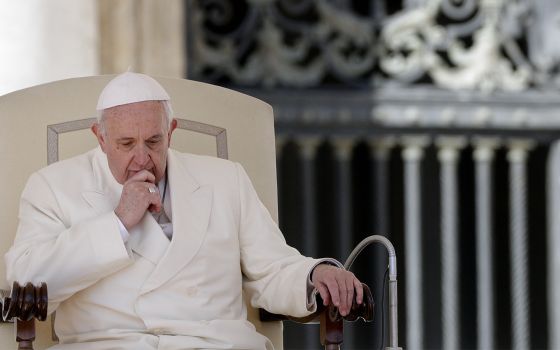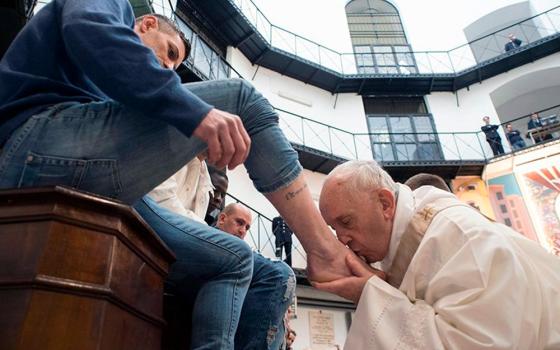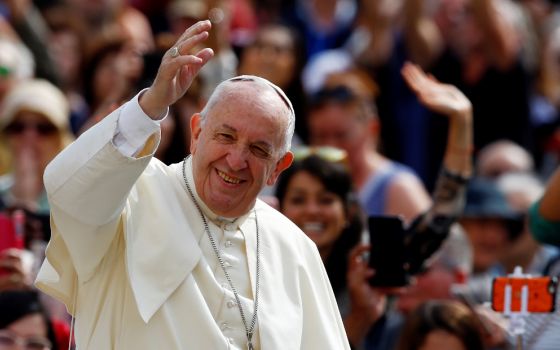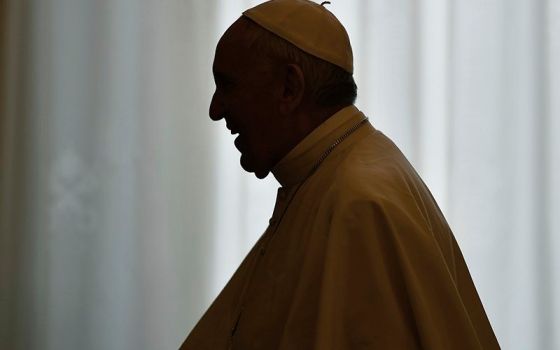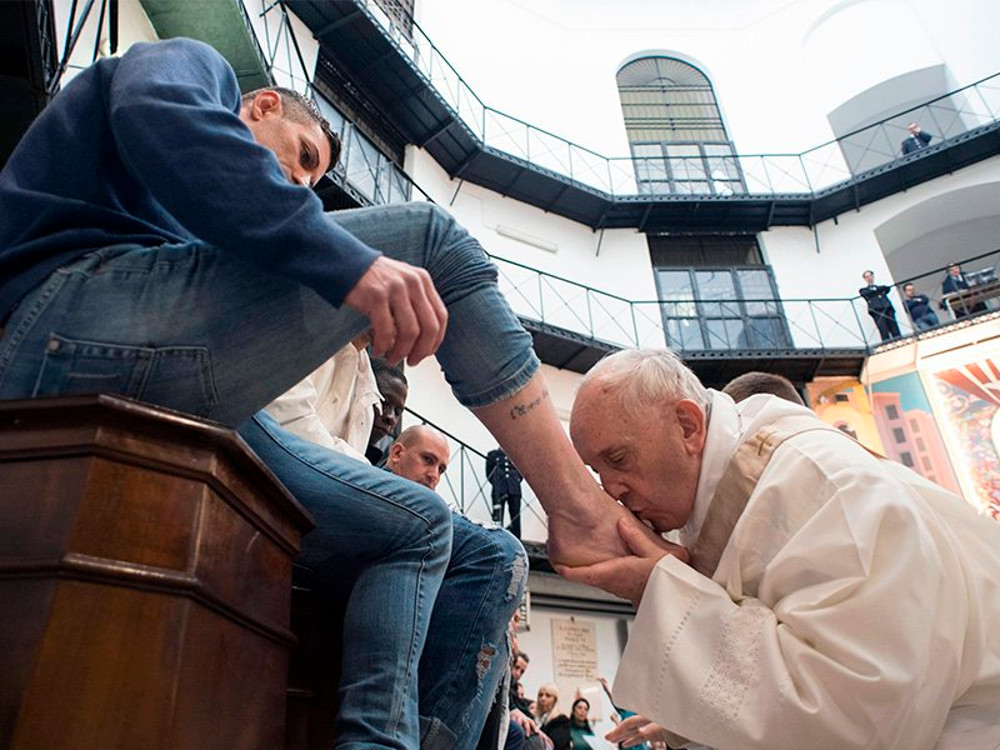
Pope Francis washes the feet of inmates on March 29 during his visit to the Regina Coeli detention center in Rome, where he celebrated the "Missa in Coena Domini." (Vatican Media via AP)
Describing holiness in his latest apostolic exhortation, Pope Francis does not resort to theological abstractions. Rather, he uses the simple words of Jesus in the Beatitudes: "happy" and "blessed."
"The word 'happy' or 'blessed' thus becomes a synonym for 'holy.' It expresses the fact that those faithful to God and his word, by their self-giving, gain true happiness," Francis writes in Chapter 3 of Gaudete et Exsultate ("Rejoice and Be Glad"), which was released in March.
Not that he sees holiness as a simple prospect. The pope acknowledges that living the Beatitudes means "going against the flow" of the world. Francis urges us to let the Lord's words "unsettle us, to challenge us and to demand a real change in the way we live."
"In the Beatitudes," he says, "we find a portrait of the Master, which we are called to reflect in our daily lives."
"Blessed are the poor in spirit, for theirs is the kingdom of heaven."
The world finds security in wealth, but Francis warns, "once we think we are rich, we can become so self-satisfied that we leave no room for God's word, for the love of our brothers and sisters, or for the enjoyment of the most important things in life."
He cites St. Ignatius of Loyola, who urged an "indifference" to riches in order to have an interior freedom. But he also notes that St. Luke, in his Gospel, does not speak of poverty "of spirit" but simply of those who are poor. Jesus "invites us to live a plain and austere life" and "to share in the life of those most in need."
"Blessed are the meek, for they will inherit the earth."
In a world of conflict, Jesus proposes the way of meekness. "Learn from me; for I am gentle and humble of heart, and you will find rest for your souls" (Matthew 11:29).
"If we are constantly upset and impatient with others, we will end up drained and weary," says Francis. "But if we regard the faults and limitations of others with tenderness and meekness, without an air of superiority, we can actually help them and stop wasting our energy on useless complaining."
This meekness should be displayed "even when we defend our faith and convictions," writes Francis. "In the Church we have often erred by not embracing this demand of God's word."
Francis acknowledges that the normal response is, "If I am that meek, they will think that I am an idiot, a fool or a weakling," but Jesus says, "the meek will inherit the earth."
"Reacting with meekness and humility," explains Francis, "that is holiness."

“The Sermon on the Mount” by Carl Bloch, created in 1877. (Image courtesy of Creative Commons)
"Blessed are those who mourn, for they will be comforted."
The world tells us that "entertainment, pleasure, diversion and escape make for the good life," reports Francis. "The world has no desire to mourn; it would rather disregard painful situations, cover them up or hide them."
On the other hand, followers of Jesus "are unafraid to share in the suffering of others; they do not flee from painful situations," explains Francis. "They discover the meaning of life by coming to the aid of those who suffer, understanding their anguish and bringing relief."
"Blessed are those who hunger and thirst for righteousness, for they will be filled."
Pope Francis acknowledges how "easy it is to become mired in corruption, ensnared in the daily politics of quid pro quo, where everything becomes business." As a result, "many people suffer injustice, standing by powerlessly while others divvy up the good things of this life."
Rather, "True justice comes about in people's lives when they themselves are just in their decisions; it is expressed in their pursuit of justice for the poor and the weak." Quoting Isaiah, Francis urges, "Seek justice, correct oppression; defend the fatherless, plead for the widow."
"Blessed are the merciful, for they will receive mercy."
Mercy, one of Francis' favorite themes, has two aspects: "It involves giving, helping and serving others, but it also includes forgiveness and understanding," he writes. It is the fulfillment of the golden rule: "In everything, do to others as you would have them do to you."
In the Gospel of Luke, Jesus tells us: "Be merciful, even as your Father is merciful." "Giving and forgiving," explains Francis, "means reproducing in our lives some small measure of God's perfection, which gives and forgives superabundantly."
"All of us have been looked upon with divine compassion," says Francis. We should therefore hear him saying to us, "Should not you have had mercy on your fellow servant, as I had mercy on you?" (Matthew 18:33).
Advertisement
"Blessed are the pure in heart, for they will see God."
"The Bible uses the heart to describe our real intentions," explains Francis, "the things we truly seek and desire, apart from all appearances." This Beatitude "speaks of those whose hearts are simple, pure and undefiled, for a heart capable of love admits nothing that might harm, weaken or endanger that love."
"A heart that loves God and neighbor (cf. Matthew 22:36-40), genuinely and not merely in words, is a pure heart," writes Francis.
"Blessed are the peacemakers, for they will be called children of God."
Although this beatitude makes us think of the endless situation of war in our world, Francis starts with "The world of gossip, inhabited by negative and destructive people." Such people "are really the enemies of peace."
Peacemakers, on the other hand, build peace and friendship in society. "And if there are times in our community when we question what ought to be done, 'let us pursue what makes for peace' (Romans 14:19), for unity is preferable to conflict."
This evangelical peace "excludes no one but embraces even those who are a bit odd, troublesome or difficult, demanding, different, beaten down by life or simply uninterested."

“The Sermon of the Beatitudes” by James Tissot, created circa 1890. (Image courtesy of Brooklyn Museum/Creative Commons)
"Blessed are those who are persecuted for righteousness' sake, for theirs is the kingdom of heaven."
People are "persecuted simply because they struggle for justice, because they take seriously their commitment to God and to others," Francis reminds us.
"In living the Gospel, we cannot expect that everything will be easy, for the thirst for power and worldly interests often stands in our way," warns Francis.
Living the beatitudes "will be viewed negatively, regarded with suspicion, and met with ridicule."
At the same time, we should not bring persecution on ourselves. "The saints are not odd and aloof, unbearable because of their vanity, negativity and bitterness," says Francis.
"Holiness, then, is not about swooning in mystic rapture," he argues. Rather, he notes how Jesus later expands on the beatitude of mercy when he explains how we will be judged: "I was hungry and you gave me food, I was thirsty and you gave me drink, I was a stranger and you welcomed me, I was naked and you clothed me, I was sick and you took care of me, I was in prison and you visited me."
Francis cautions, though, that being a Christian means more than simply performing certain good works. It also means seeking social change. Quoting the Canadian bishops, he writes, "For later generations to also be released, clearly the goal had to be the restoration of just social and economic systems, so there could no longer be exclusion."
Francis warns against separating these Gospel demands from our personal relationship with the Lord. To do so makes Christianity "a sort of NGO stripped of the luminous mysticism so evident in the lives of Saint Francis of Assisi, Saint Vincent de Paul, Saint Teresa of Calcutta, and many others."
The other temptation is to see social engagement "as superficial, worldly, secular, materialist, communist or populist." Or to see it as less important than a particular ethical issue or cause.
"Our defense of the innocent unborn, for example, needs to be clear, firm and passionate, for at stake is the dignity of a human life, which is always sacred and demands love for each person, regardless of his or her stage of development. Equally sacred, however, are the lives of the poor, those already born, the destitute, the abandoned and the underprivileged, the vulnerable infirm and elderly exposed to covert euthanasia, the victims of human trafficking, new forms of slavery, and every form of rejection."
Today this applies especially to migrants. For Christians, Francis writes, "the only proper attitude is to stand in the shoes of those brothers and sisters of ours who risk their lives to offer a future to their children. Can we not realize that this is exactly what Jesus demands of us, when he tells us that in welcoming the stranger we welcome him (cf. Matthew 25:35)?"
Francis does not downplay the importance of prayer and worship of God, "but we cannot forget that the ultimate criterion on which our lives will be judged is what we have done for others."
"Those who really wish to give glory to God by their lives, who truly long to grow in holiness," concludes Francis, "are called to be single-minded and tenacious in their practice of the works of mercy."
[Jesuit Fr. Thomas Reese is a columnist for Religion News Service and author of Inside the Vatican: The Politics and Organization of the Catholic Church.]




